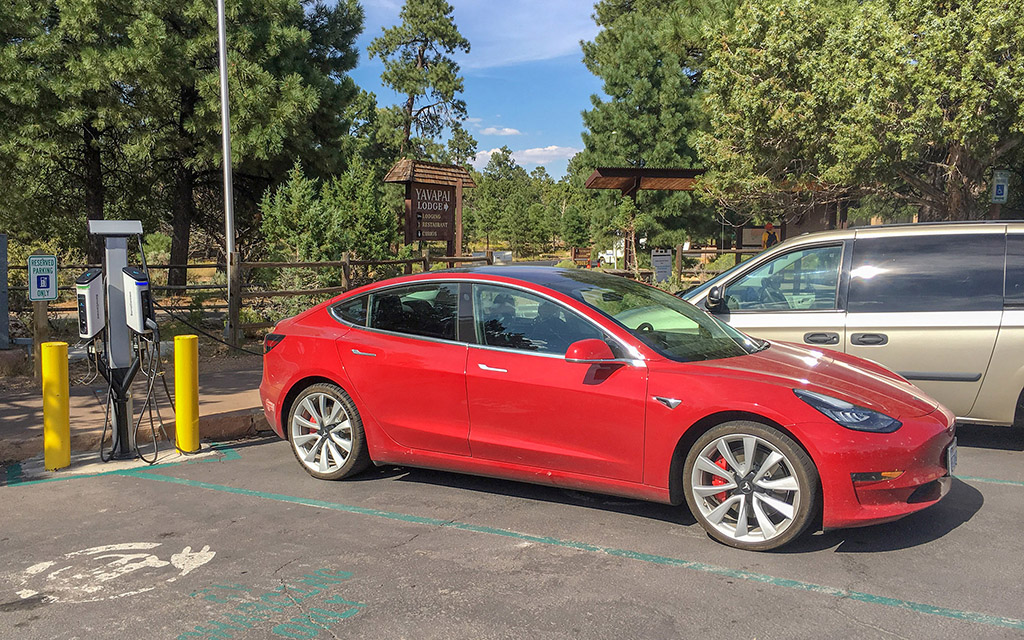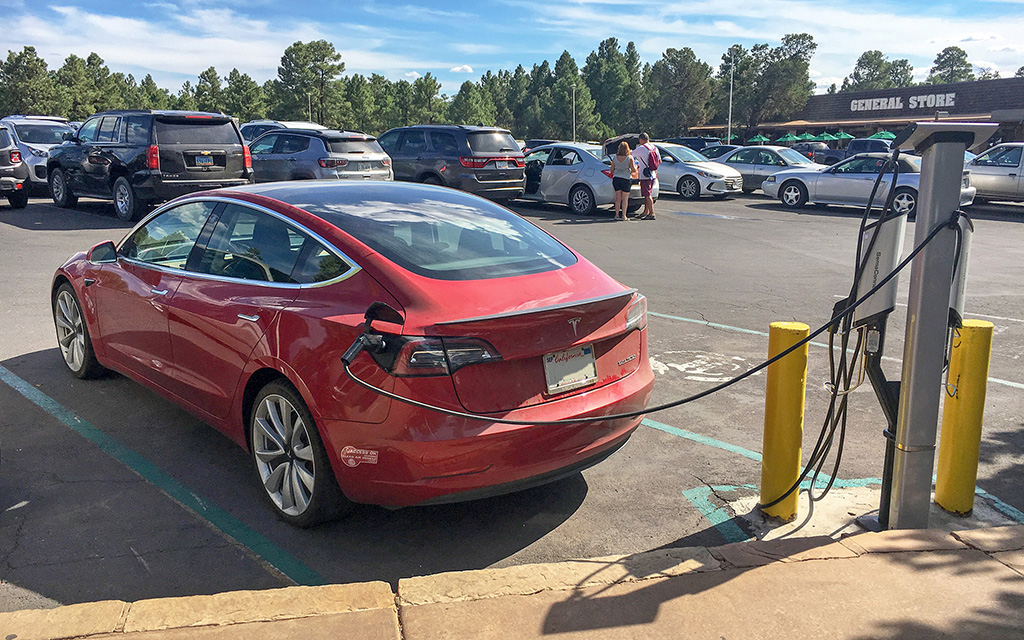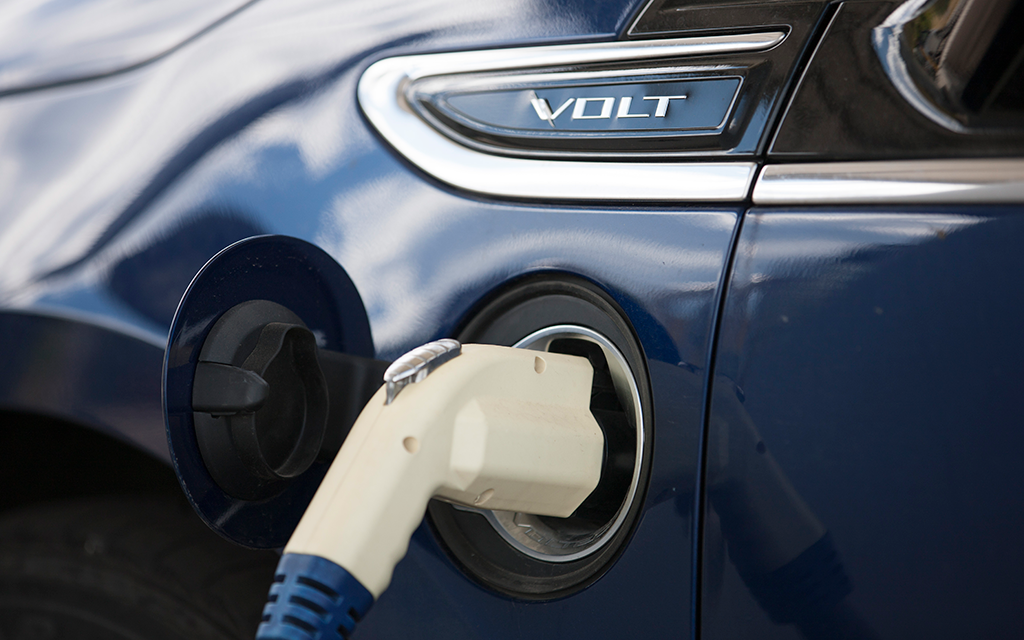
State and local governments in Arizona are scheduled to replace about 20,000 vehicles in their fleets over the next decade – and could save $283 million in fuel and maintenance if they replaced them with electric vehicles, a recent report says. A car recharges at a station in Grand Canyon National Park in this 2019 photo. (Photo by Michael Quinn/Grand Canyon National Park)
WASHINGTON – Arizona governments could save almost $283 million over the next 10 years if roughly 20,000 gasoline-powered light-duty vehicles in their fleets that are due to be retired were replaced with electric vehicles, according a recent report.
The 38-page report by the Public Interest Research Group said that if state and local governments nationwide made a similar transition, it could save $11 billion in fuel and maintenance costs over the next decade.
Despite the eye-popping numbers, Diane Brown, the executive director of Arizona PIRG Education Fund said the report “takes a very conservative view in regards to its findings.”
“It did not make assumptions on the cost of the EVs decreasing, which we know is the trend. Nor did it factor in potential increases in gas prices which we know have been escalating,” Brown said.
“We didn’t assume anything beyond what is available today,” she said.
The report says that more electric vehicles are coming on the market every year and that those models are improving rapidly. It also notes that a new federal program could allow state and local governments to receive a credit of up to $7,500 on a new electric vehicle through a new “direct pay” mechanism.
About two-thirds of the expected savings would come through lower fuel costs, with the rest coming from reduced maintenance typically required of electric vehicles.
The report, Electric Vehicles Save Money for Government Fleets, does not factor in the cost of additional infrastructure, like EV charging points – a fact that it acknowledges. Brown said that was due to the number of variables involved, like the fact that charging stations can be used by multiple vehicles. That makes it difficult to estimate how many additional charging stations would be needed in Arizona if governments in the state added 20,000 electric vehicles to their fleets.
In addition to the financial savings, a fleet transition would also improve air quality by reducing vehicle emissions, according to the report. It said that Arizona could see a 462,000-ton reduction in greenhouse gas emissions by replacing gas vehicles with electric.
Electric vehicles are a key way of reducing emissions from the transport sector, which represents 28% of US greenhouse gases, according to the Environmental Protection Agency.
A National League of Cities official agreed that, like other climate action efforts, investing in electric vehicles is both a “sound financial investment” and “essential for healthy and socially just communities.”
Peyton Siler Jones, the NLC’s sustainability program director, said in an email that replacing gasoline-fueled vehicles with electric ones is indeed a way of bringing fuel and maintenance costs down. But critical to this shift, she said, is “to embed an EV purchasing program within a wider transportation strategy that prioritizes public and active transit and reduces vehicle miles traveled.”
This would “maximize benefit to all people and minimize environmental harm of extraction, processing and disposal of metals used for EV batteries,” she said.
A general concern with increasing the number of EVs in Arizona is how the power grid would cope with the additional demand, particularly at peak times.

An electric vehicle charges at a station at the Grand Canyon National Park in this 2019 photo. Arizona has 2,935 public EV-charging stations, according to the Energy Department. (Photo by Michael Quinn/Grand Canyon National Park)
Burrell Kilmer, electric vehicle manager with Salt River Project, said it is planning for this future grid already, with the aim of powering 500,000 EVs in Arizona by 2035.
“Our goal, and the commitment behind it, is in place to ensure that SRP’s grid is ready to support our customers’ adoption of electric vehicles,” Kilmer said in an emailed statement.
“We are preparing the grid to accommodate the new electric load as it develops over time, we are implementing programs and pricing plans to enable and empower our customers, and we are supporting our communities’ efforts to advance clean, zero-emissions transportation across the region,” his statement said.
Arizona has 2,935 public charging stations, 14th-most in the nation, according to data from the U.S. Department of Energy, which said there are 40,740 electric vehicles registered in the state. That was good enough for seventh-highest among states.
The Biden administration has invested heavily in developing the electric vehicle industry, awarding $2.8 billion last year in grants to expand domestic manufacturing of batteries and strengthen U.S. supply of minerals critical to the industry.
Arizona Gov. Katie Hobbs’ office did not respond to a request for comment on the report. But Brown called on authorities to act on the report’s findings and “establish strong local and state plans” to “save taxpayers even more money.”
What's Working
-
Electric school bus helps Latina moms combat air pollution
There are about 480,000 school buses in the country, less than one percent of them are electric. Replacing diesel school buses with electric ones would reduce greenhouse emissions by 5.3 million tons a year, it would also be better for students lungs. More than 4 in 10 people in the country live in neighborhoods with unhealthy air. In Arizona, a group of mom's organized and were able to convince the school board to purchase and electric bus. Then, they garnered votes to help pass a bond to purchase the bus.Read Full Story

